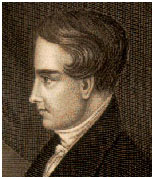 "I am deeply persuaded that there will be no full, soul-filling,
heart-ravishing, heart-satisfying outpouring of the Spirit of God till there be
more praise and thanking the Lord. Let me stir up your hearts to praise."
"I am deeply persuaded that there will be no full, soul-filling,
heart-ravishing, heart-satisfying outpouring of the Spirit of God till there be
more praise and thanking the Lord. Let me stir up your hearts to praise."Born in Edinburgh, Scotland, in 1813, Robert Murray McCheyne was one of God's blessings given to Scotland in the early part of the 19th century.
Robert displayed outstanding intellectual skills as a child: at the age of four, he taught himself to name and to write the Greek alphabet, while recovering from an illness. He later used a remarkable memory to memorize long passages of Scripture.
Attending the University of Edinburgh, he was greatly influenced by Thomas Chalmers. He graduated in 1830.
Having been licensed to preach when he was 22, McCheyne was ordained a year later and began pastoring in Dundee, Scotland.
For six years he was pastor of St. Peter's Church (of the Church of Scotland), which grew to over one thousand members.
In 1839 he visited Palestine concerning future evangelization of the Jewish people. While there, he prayed fervently for his congregation back home. Upon his return he found that a spiritual awakening was in progress. His preaching consequently made a significant contribution to the revival and helped it spread across Scotland to northern England.
He used his intellectual ability to design sermons that had a tremendous persuasion upon the unconverted. He was only 30 when he died in 1843, reportedly of typhoid fever. He was buried beside St. Peter's Church, Dundee, where an imposing tombstone marks his grave.
Few men have had the impact in a long lifetime that Robert Murray McCheyne had in his 30 years. Though his ministry lasted only seven years, he is recognized as one of the great spiritual leaders of his day. His was a daily walk with God, and it was perhaps his Christ-like dependence upon God's Spirit that left such a deep impression on men's lives.
After hearing him preach, one Scottish evangelist reportedly said, "He preached with eternity stamped upon his brow. I trembled, and never felt God so near."
McCheyne's life undoubtedly exemplified the words he so often repeated: "Live so as to be missed."